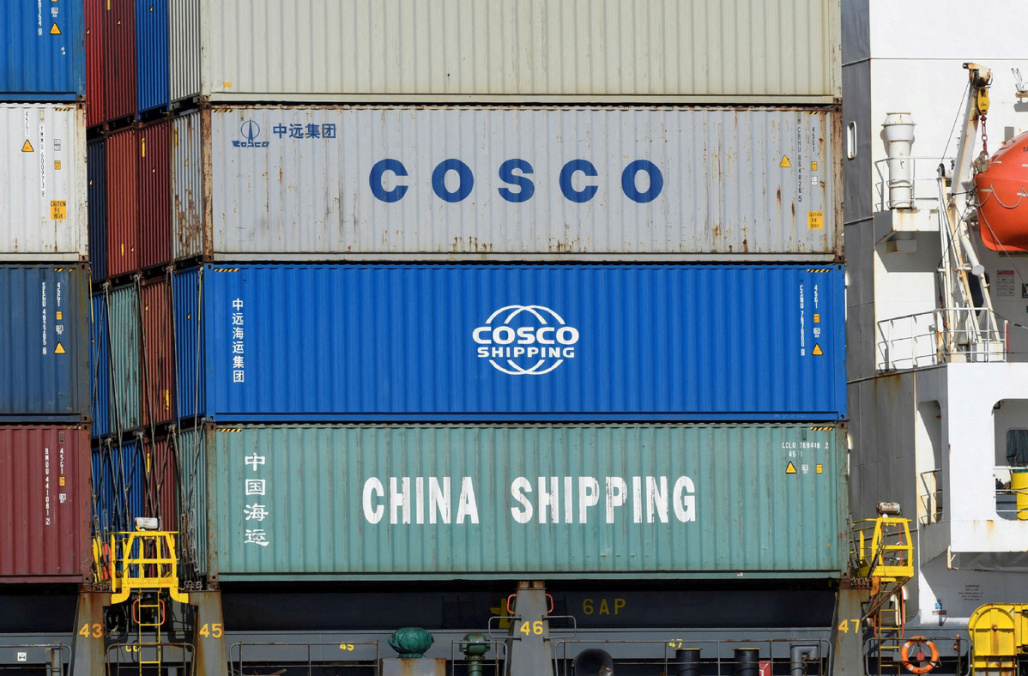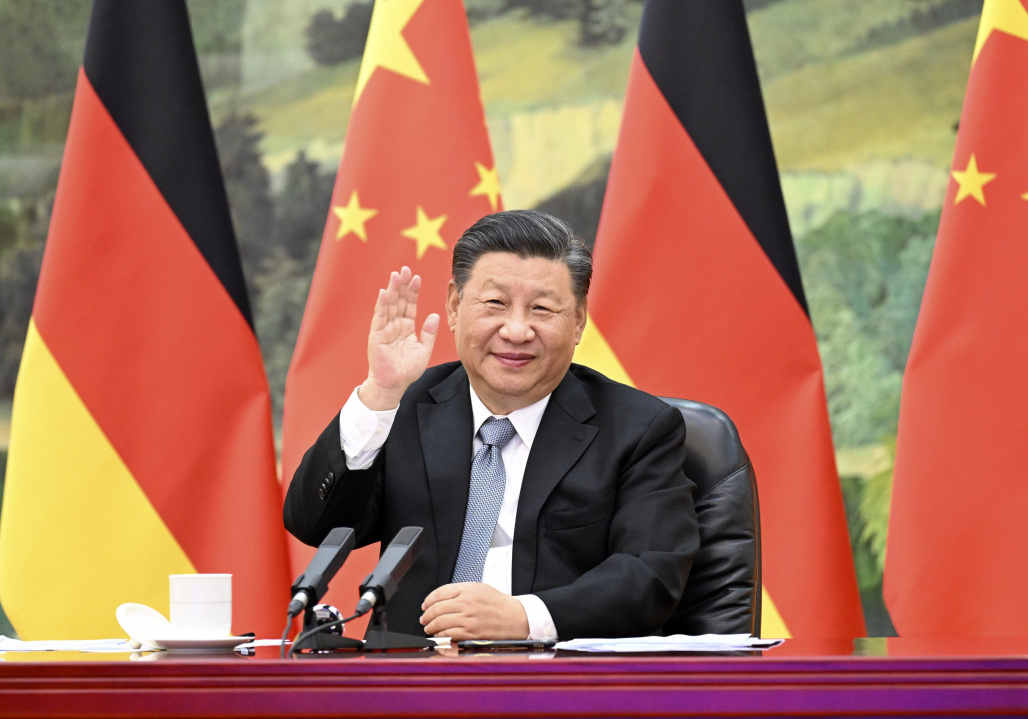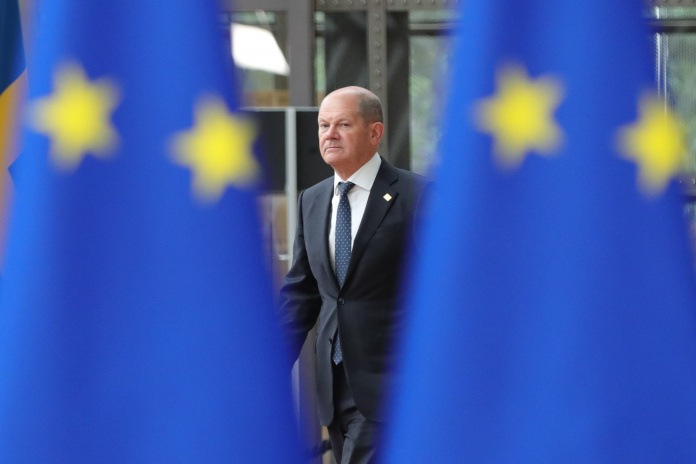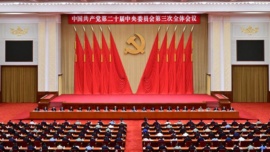By Pedro Sacadura in Brussels

On November 4, German Chancellor Olaf Scholz will become the first European Union leader to visit China since the start of the COVID-19 pandemic and following the mid-October Communist Party Congress. He’ll be travelling with a handful of top executives looking to boost business links as Germany’s economy falters. However, his solo trip appears to have been raising eyebrows, both in Brussels and beyond, as the EU struggles to keep a unified approach over its turbulent relationship with Beijing. For some, Scholz is rightfully looking to keep an open channel with China. But others argue he’s “playing with fire” and might get burned.
This Friday, Olaf Scholz’s visit to Beijing will be anything but overlooked. The German Chancellor is embarking on an apparent mission to deepen business ties with China – aligning with his predecessor’s policy – amid warnings of growing economic dependence, the threat of economic coercion and a prospective level of reliance that might prove, in time, as unsettling as relations with Russia.
Scholz, who will meet Chinese President Xi Jinping for the first time since he took the lead of Germany’s ruling coalition, is expected to put pressure on what was its biggest trading partner in 2021, to open its markets, providing equal access conditions, whilst raising human rights concerns, including about minorities such as the Uyghur community.
It will also be a chance to discuss pressing issues like climate change – with China being a key partner in tackling the problem – Taiwan, and Russia’s war in Ukraine, which poses a threat to Europe’s security.
But it’s all likely to become quite a difficult balancing act as the fine-tuning of a new “China Strategy” is causing friction within Scholz’s own government as well and piling additional pressure onto his visit.
“Mr. Scholz’s visit to Beijing, at this stage, sends really the wrong message. Not only because it’s too close to the 20th National Congress of the Chinese Communist Party, that just appointed Mr. Xi for a third mandate, (…) but also [because] Scholz goes there alone,” Ricardo Borges de Castro, Associate Director and Head of the Europe in the World Programme at the Brussels-based European Policy Centre, told Macau Business.
“It’s just about Germany, but then there’s the European Union. Germany is the biggest economy [of the EU]. I think he [Scholz] undermines the unity that the EU needs to have in dealing with China.”
He concluded: “there are several concerns about the way Germany is just doing whatever they think is relevant for them. Of course, we also need to understand that economic crisis in Germany and any situation that could undermine Germany’s position in the EU is bad for the EU overall. But I think even more because of this reason, Germans have more responsibility in this regard and so they can’t make just decisions thinking about their own self-interest. It would be in the self-interest of everybody, including themselves, if this would be done in a coordinated way.”
The right timing
For Ricardo Borges de Castro there is another issue: Germany currently holds the Presidency of the G7.
“We cannot forget that Germany still holds, this year, the presidency of the G7. So its the presidency of the G7 that is going to Beijing. (…) In my view [that] can undercut a unified message from the West, from the G7, in what regards Russia’s war on Ukraine [as well].”
He believes it would make more sense if Olaf Scholz and Xi Jinping would, instead, meet in person on the sidelines of the upcoming G20 Bali Summit, being held on 15 and 16 November.
“I think the fact that Germany, France, Italy, the EU leaders and others will be in Indonesia would be the moment to meet Mr. Xi, to show a unified front regarding China and certainly showing a unified Western front regarding Russia.”
China continues to refuse to publicly condemn Russia’s invasion of Ukraine, choosing, instead, an ambiguous position, and earlier this year, before Moscow launched the military operation, president Xi and his Russian counterpart, Vladimir Putin, proclaimed a “no limits friendship.”
“Neutrality in this case favours the aggressor. So the Chinese are, by omission, favouring Russia’s aggression,” said Ricardo Borges de Castro.
A divisive trip
A number of CEOs from Germany’s top firms will accompany Scholz in his visit to China, such as the top executives of Adidas, Deutsche Bank, Siemens vaccine maker BioNTech and Volkswagen, according to Bloomberg.
The depth of economic relations between the two countries can be seen by the fact that China has been Germany’s top trade partner for six consecutive years.
However some German CEOs are reportedly dissatisfied with Olaf Scholz’s trip to Beijing and are said to have voiced concerns about their public image as Germany still faces heavy criticism for its bonds with Russia and its fossil fuel reliance.
The visit has been criticised both at a domestic and on an international level. It also follows a recently approved sale of a 24.9% stake in a terminal of the Port of Hamburg to Chinese shipping giant COSCO. The move has prompted concerns of further Chinese soft power and has sparked resistance within Germany’s coalition partners.

Within the so-called “traffic light” coalition cracks are emerging regarding the approach towards Beijing. Scholz, on the one hand, is interested in continuing a profitable trade relationship, accounting for millions of direct and indirect jobs and for 246 billion euros of goods traded between the nations last year.
China has become one of the most important markets for German machinery, chemicals and cars and it’s highly unlikely things will change anytime soon.
But the Greens and the liberal FDP party, however, are reluctant about trading ties with China.
Ahead of this Friday’s visit, the German Foreign Minister Annalena Baerbock asked Scholz to take a tougher approach to Xi Jinping.
“As is well known, we clearly stated in the coalition agreement that China is our partner on global issues, that we cannot decouple in a globalised world, but that China is also a competitor and increasingly a systemic rival”, she said.
The Minister’s words are a call to action for Scholz to strike, in Beijing, a balance between partnership, competition and strategic rivalry, as Germany also looks to diversify its supply chains and boost domestic security.
A sentiment that is echoed within the European Parliament.
“Olaf Scholz should make it clear in China that we take the systemic rivalry with the communist regime there seriously,” said Reinhard Bütikofer, from the Greens/EFA Group in the European Parliament, who also chairs the Delegation for Relations with the People’s Republic of China.
“He should send a signal that the new German government, unlike Mrs. Merkel’s, stands up for the Germans sanctioned by China and expects the sanctions to be withdrawn.”
Bütikofer added: “Scholz should emphasise European and Transatlantic common ground towards China, as the coalition agreement does.” He should “warn Beijing against Taiwan adventures” and “make clear that it is not the interests of a few CEOs of large companies that determine the German economic policy towards China, but our German and European values and interests.”

Thierry Breton, the EU’s industry chief, on the other hand, recently warned European governments and businesses that they must realise China is a rival to the 27-nation bloc and that they shouldn’t be naive when they green-light Chinese investments. An apparent message to Germany.
“It’s very important that the behaviour of member states towards China changes in a way that’s more coordinated than individually-driven, as China obviously wants us to be,” he mentioned, when asked about Scholz’s visit during an interview with Reuters.
Breton also justified a more defensive EU approach towards China as a consequence of Beijing’s behaviour during the COVID-19 pandemic and warned European companies against investing in an increasingly “autocratic” country.
He added that during that period, Chinese authorities took advantage of countries’ reliance on China for a wide range of equipment, such as face masks, to gain diplomatic leverage.
Decoupling from China?
The US and other allies claim Germany – stuck between Washington and Beijing rivalry – should be focused on decoupling, rather than deepening economic ties with Beijing.
But the German chancellor has already said decoupling from China would be the “wrong answer,” as “globalisation has been a success story that enabled prosperity for many people.”
Ricardo Borges de Castro, from the Brussels-based European Policy Centre, told Macau Business the costs of this would simply be untenable.
“The cost of severing ties with China, which I don’t think anyone is advocating for, could be very high.”
He believes it is important to think, instead, about “the pathways in which such a breakout or a breakdown of relations could happen, but also to look where are the vulnerabilities.”
Borges de Castro added: “If we are actually going to decouple, I think it’s better to be by design and not by accident. The way I see things moving is that everything is sort of building up for a potential accident. Then no one actually knows how to deal with it. (…) My plea is: let’s quantify what does this mean if in case it does happen.”
Executive Vice-President of the European Commission Valdis Dombrovskis, who is in charge of economic affairs, also reportedly said he believed that decoupling from China is not an option for EU companies, and that “the EU should continue engaging with China with pragmatism”, Xinhua News Agency noted in a feature article on China-Germany relations.
“We commend these remarks from the European leaders,” Chinese Foreign Ministry spokesperson Mao Ning told a daily news briefing, adding that China also supports globalization and opposes decoupling.
Last year, China-EU trade volume exceeded 800 billion dollars for the first time and two-way investment went beyond 270 billion dollars in cumulative terms, according to Chinese statistics.
In recent days Beijing has been underlining the importance of Scholz’s trip and rejected criticism against the acquisition by COSCO of a key stake in Hamburg’s container terminal.
“Cooperation benefits both sides”, said another Chinese Foreign Ministry spokesman Wang Wenbin last Wednesday, adding that China hopes “relevant parties will view China-Germany practical cooperation in a rational light and stop groundless hype”.





















